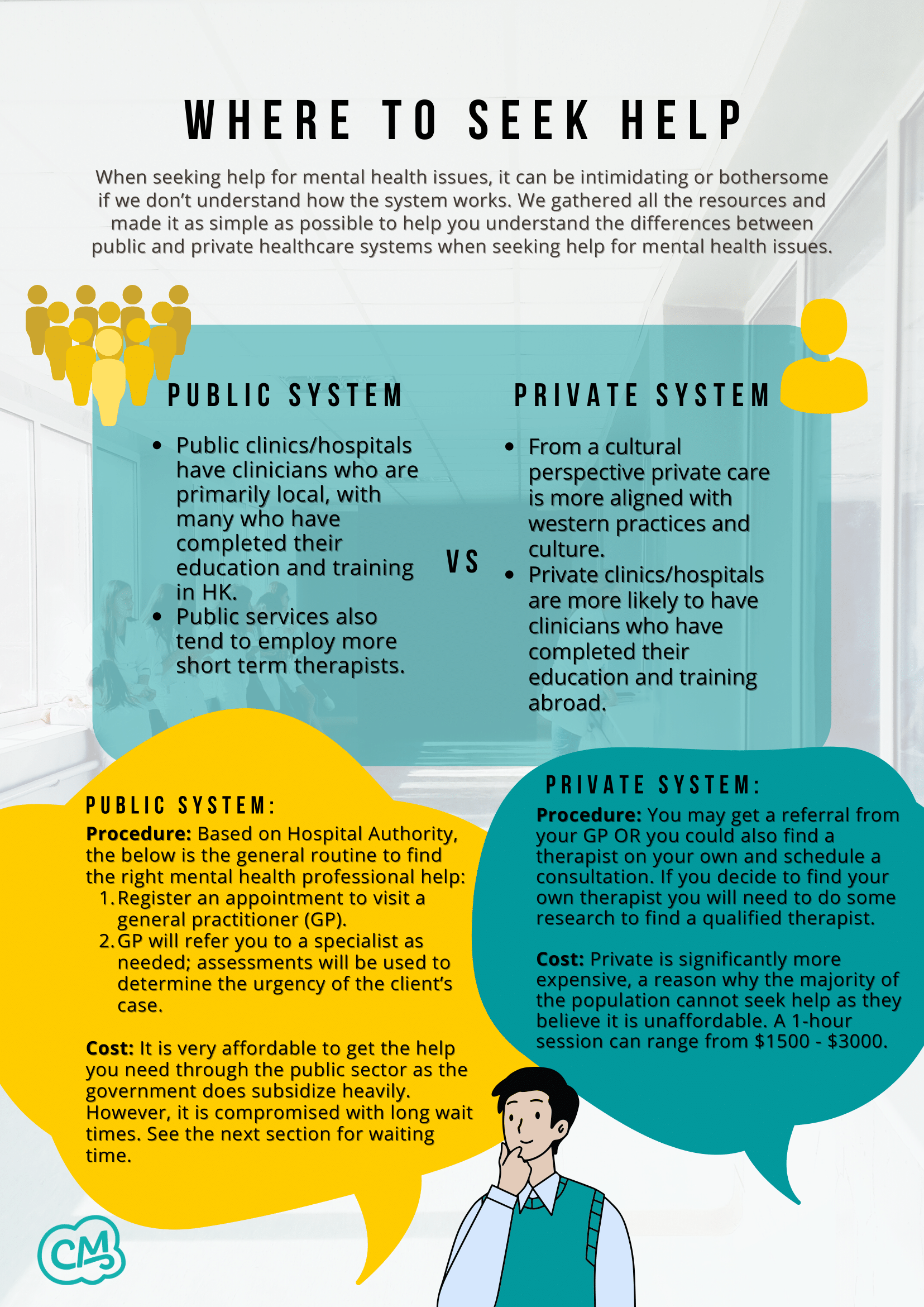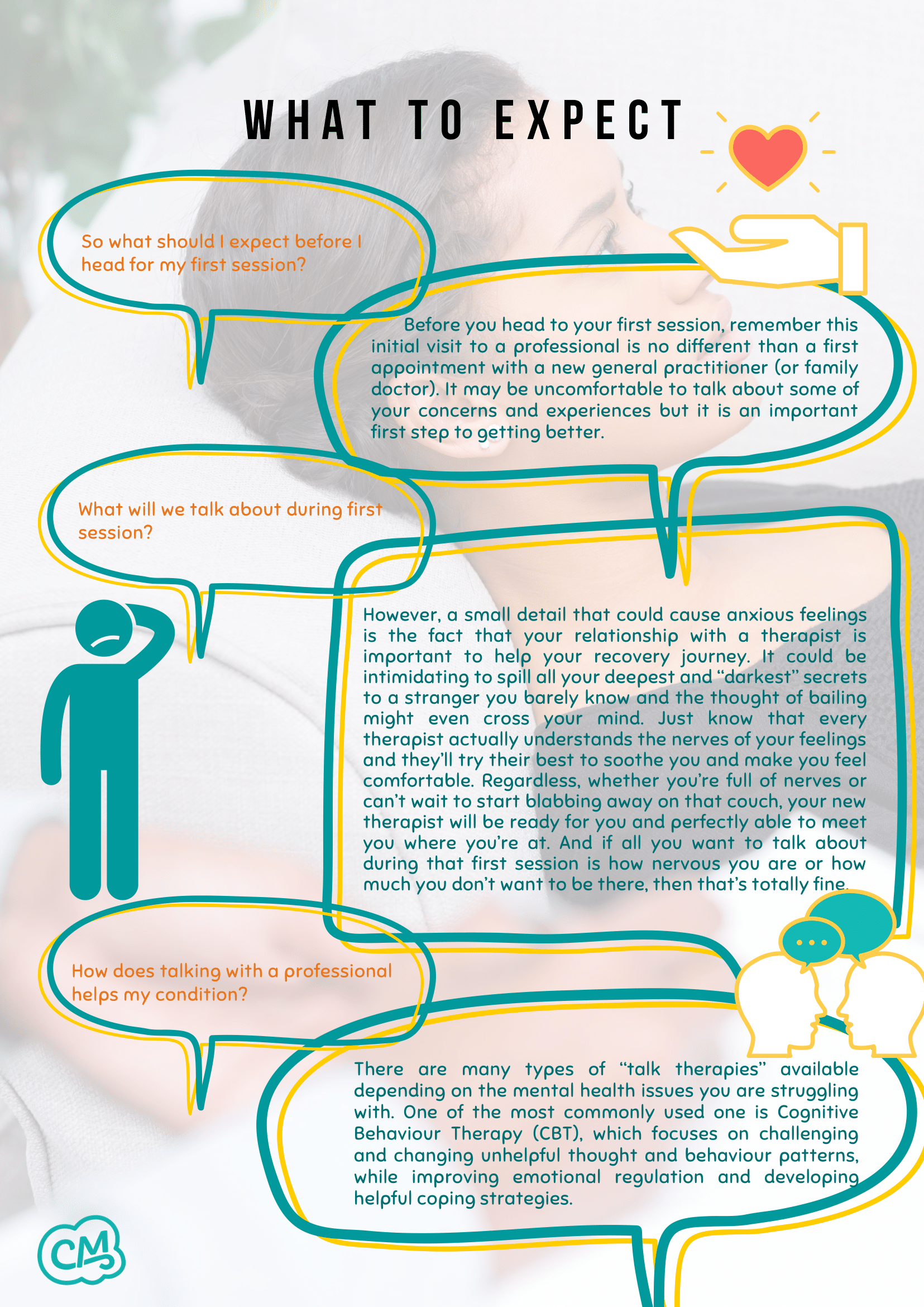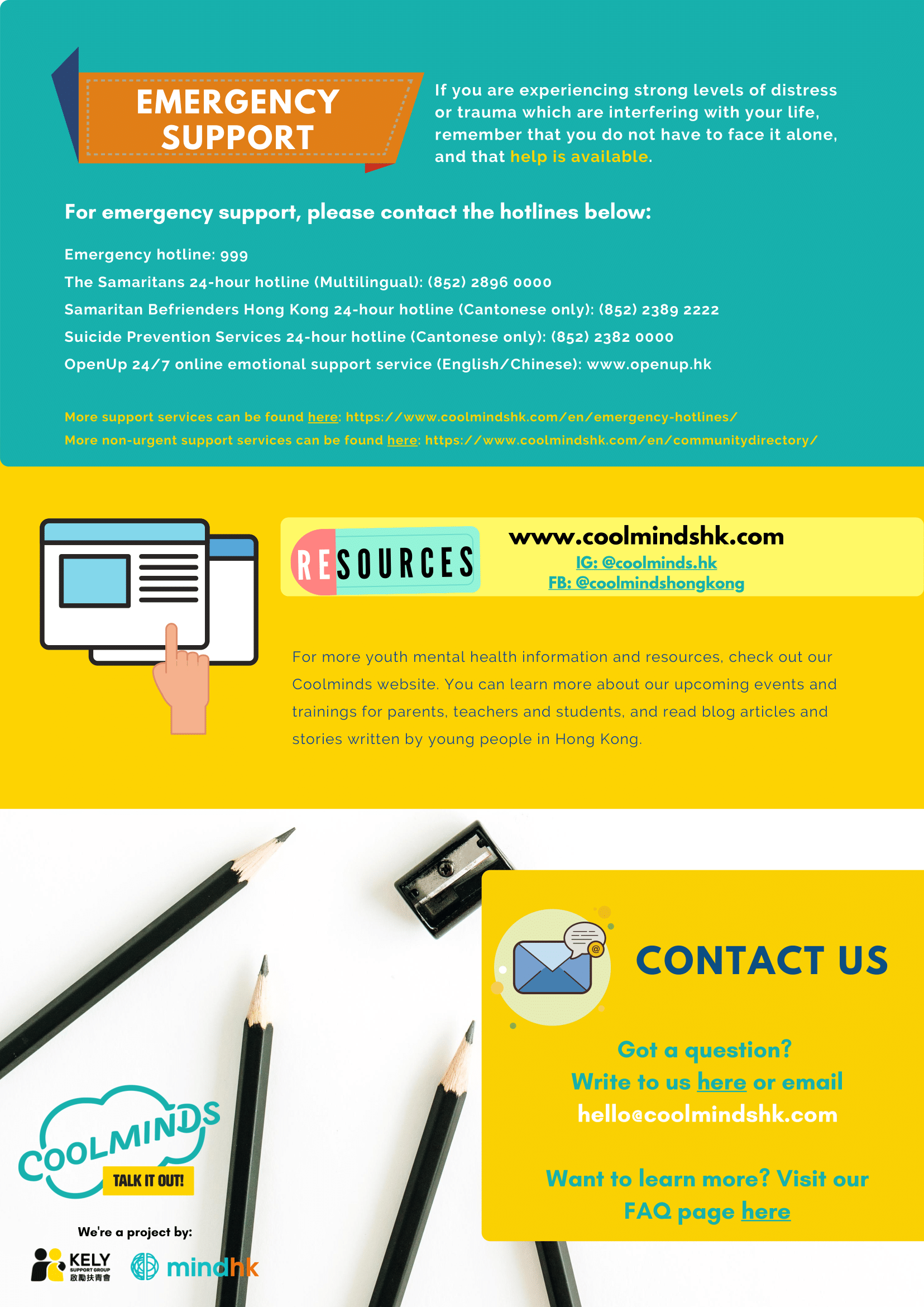Who to seek help from
Congratulations! If you are reading this section, that means you’re ready for change. But we know that seeking help can be confusing and overwhelming so let’s start by understanding what different mental health professionals do and how they can help. Here’s a guide on the range of mental health professionals that you may find:
General practitioner (GP)
General practitioners, also known as family doctors, are medical doctors specializing in general medicine. They are also the doctors you see when you are feeling physically unwell. Your GP is often the first professional you would see when you are struggling with your mental health. They are trained to assess, diagnose and treat mild to moderate mental health conditions. GP’s can prescribe medications and provide preventative care and health education. They can also refer and direct you to the appropriate specific mental health professionals. Seeing your GP is the best first step to getting help.
Psychiatrists
Psychiatrists are licensed medical doctors who specialize in mental health. They are trained to assess, diagnose and treat mental health disorders, primarily through prescribing and monitoring medication treatment, they often do not provide “talk therapy”. Your visit with a psychiatrist may include a blood test, a physical assessment and a risk assessment. Psychologists can work at hospitals, private offices, or community health centres.
Mental health nurse
A psychiatric nurse is a registered nurse with specialised training in mental health. A psychiatric nurse assesses, supports and advocates for care. They typically assist and work with psychiatrists working in the public health care system. As part of their role they follow up with patients regarding medications, and needed supports.
Social workers
Social workers are dedicated to helping people navigate and solve issues in their lives which may be caused by relationship problems, adjustment issues, traumatic events, or disabilities, etc. Through case management, they redirect clients to resources that best support them. Social workers can be found in a variety of settings, such as schools, private offices, hospitals, community health centres, and non-profit organisations.
Counsellors
Counsellors are masters-level professionals. They aim to help people to understand the complex social welfare system and help to access resources which support a person’s wellbeing. They also receive basic counselling training and may be able to provide counselling to people in distress. Counsellors can be found at schools, hospitals, community health centres, and in private practice.
So what’s the difference between a counsellor and a psychologist?
Psychologists often have more formal education who are trained to diagnose and treat specific mental illnesses, whereas counsellors help people to process and cope with their mental health struggles.
Clinical psychologists
In general, psychologists have doctoral training qualifications; however, they are not medical doctors and do not prescribe medication. Clinical psychologists are specially trained to diagnose and treat mental illnesses through talk therapy, and they are the most common type of psychologist you would see for a mental health issue.
Educational psychologists
Educational psychologists are trained in teaching and education, focusing on learning-related issues. They work with students, parents, teachers, and support professionals to help students in the school setting. Psychologists can be found in places such as private offices, hospitals, and schools.
Where to seek help
When seeking help for mental health issues, it can be intimidating or bothersome if we don’t understand how the system works. We gathered all the resources and made it as simple as possible to help you understand the differences between public and private healthcare systems when seeking help for mental health issues.
Public system
- Public clinics/hospitals have clinicians who are primarily local, with many who have completed their education and training in HK.
- Public services also tend to employ more short term therapists.
- Procedure: Based on Hospital Authority, the below is the general routine to find the right mental health professional help:
- Register an appointment to visit a general practitioner (GP).
- GP will refer you to a specialist as needed; assessments will be used to determine the urgency of the client’s case.
- Cost: It is very affordable to get the help you need through the public sector as the government does subsidise heavily. However, it is compromised with long wait times. See the next section for waiting time.
Private system
- From a cultural perspective private care is more aligned with western practices and culture.
- Private clinics/hospitals are more likely to have clinicians who have completed their education and training abroad.
- Procedure: You may get a referral from your GP OR you could also find a therapist on your own and schedule a consultation. If you decide to find your own therapist you will need to do some research to find a qualified therapist.
- Cost: Private is significantly more expensive, a reason why the majority of the population cannot seek help as they believe it is unaffordable. A 1-hour session can range from $1500 – $3000.
What to expect
So what should I expect before I head for my first session?
Before you head to your first session, remember this initial visit to a professional is no different than a first appointment with a new general practitioner (or family doctor). It may be uncomfortable to talk about some of your concerns and experiences but it is an important first step to getting better.
What will we talk about during first session?
However, a small detail that could cause anxious feelings is the fact that your relationship with a therapist is important to help your recovery journey. It could be intimidating to spill all your deepest and “darkest” secrets to a stranger you barely know and the thought of bailing might even cross your mind. Just know that every therapist actually understands the nerves of your feelings and they’ll try their best to soothe you and make you feel comfortable. Regardless, whether you’re full of nerves or can’t wait to start blabbing away on that couch, your new therapist will be ready for you and perfectly able to meet you where you’re at. And if all you want to talk about during that first session is how nervous you are or how much you don’t want to be there, then that’s totally fine.
How does talking with a professional help my condition?
There are many types of “talk therapies” available depending on the mental health issues you are struggling with. One of the most commonly used one is Cognitive Behaviour Therapy (CBT), which focuses on challenging and changing unhelpful thought and behaviour patterns, while improving emotional regulation and developing helpful coping strategies.
So what will happen in the first session?
In your first session, you may be asked about:
- Your mood, thoughts and behaviours
- Your lifestyle (friendships, school, intimate relationships, family relationships)
- Any recent events in your life that might be affecting your wellbeing
- Any changes to your sleep, diet and daily activities
- Your medical history
- If you are seeing a GP or a psychiatrist they may take your blood pressure, listen to your heart, as well as doing blood tests to explore any physical issues that may contribute to your emotions and behaviours
What about with a specific mental health professional? What questions do they ask?
With a specific mental health professional you may be asked:
- How long have you been experiencing these problems or issues?
- What have you tried to do to cope with it?
- What do you think the trigger could be?
- How often are you suffering from it?
- What was your life like before this issue or problem was present?
Are there any other questions they would ask? What should I do if I don’t want to answer certain questions?
There are many other questions that a therapist will ask once you start talking about your presenting problem. They’ll start out pretty general and get more detailed as the sessions move forward.
You’ll be asked to think about what’s going on and how you’re experiencing it. Some of it will feel really personal. A therapist needs to try to understand the triggers and causes of your struggles in order to figure out how they can help. If you ever feel like you don’t want to answer a question quite yet, speak up and say so.
With certain types of therapies or cases it may involve some homework. Just be aware that often therapy is most effective when you also put in the work outside of the office as well.
Often, a therapist will ask you what your goal is for therapy. It’s helpful to figure that out upfront. But it’s also okay if you don’t have a specific goal in mind when you start. There won’t be any pressure to try and define it early on.
- Types of therapy
- Confidentiality
- Your conversations with your therapist are confidential. However, if they are concerned about your safety or the safety of others they will talk to you about disclosing to a trusted supporter (usually your parent/guardian if that is safe).
- Goals of therapy
- Give you the tools and strategies for navigating whatever is going on in your life — from stress or relationship issues to managing a mental health diagnosis
- Process of therapy journey
- Length of treatment
- Touch on it may get worse before it gets better
- Mention every case is different, just because you are diagnosed with a psychological disorder does not indicate you can be generalised and treated like any other client that has the same condition as you.
- Relapse
- We don’t expect recovery to happen overnight, and sometimes it’ll bounce back, making you think you haven’t made any progress. But this is certainly not the case. One thing we want you to take away from reading this booklet is to take the first step of speaking up and seeking help.
Emergency support
If you are experiencing strong levels of distress or trauma which are interfering with your life, remember that you do not have to face it alone, and that help is available.
For emergency support, please contact the hotlines below:
Emergency hotline: 999
The Samaritans 24-hour hotline (Multilingual): (852) 2896 0000
Samaritan Befrienders Hong Kong 24-hour hotline (Cantonese only): (852) 2389 2222
Suicide Prevention Services 24-hour hotline (Cantonese only): (852) 2382 0000
OpenUp 24/7 online emotional support service (English/Chinese): www.openup.hk
More support services can be found here: https://www.coolmindshk.com/en/emergency-hotlines/
More non-urgent support services can be found here: https://www.coolmindshk.com/en/communitydirectory/










